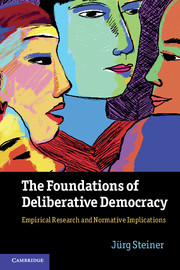Book contents
- Frontmatter
- Contents
- Figures
- Acknowledgments
- Introduction
- 1 Citizen participation in deliberation
- 2 Rationality and stories in deliberative justification
- 3 Common good and self-interest in deliberative justification
- 4 Respect in deliberation
- 5 Public openness of deliberation
- 6 Force of better argument in deliberation
- 7 Truthfulness in deliberation
- 8 Deliberation in the media and the Internet
- 9 Favorable conditions for deliberation
- 10 Favorable consequences of deliberation
- 11 The praxis of deliberation
- Appendix Newest version of Discourse Quality Index (DQI)
- Index
- References
9 - Favorable conditions for deliberation
Published online by Cambridge University Press: 05 August 2012
- Frontmatter
- Contents
- Figures
- Acknowledgments
- Introduction
- 1 Citizen participation in deliberation
- 2 Rationality and stories in deliberative justification
- 3 Common good and self-interest in deliberative justification
- 4 Respect in deliberation
- 5 Public openness of deliberation
- 6 Force of better argument in deliberation
- 7 Truthfulness in deliberation
- 8 Deliberation in the media and the Internet
- 9 Favorable conditions for deliberation
- 10 Favorable consequences of deliberation
- 11 The praxis of deliberation
- Appendix Newest version of Discourse Quality Index (DQI)
- Index
- References
Summary
Normative controversies in the literature
Establishing favorable conditions for deliberation is not a straightforward task because, empirically, deliberation is a multidimensional phenomenon. This was not fully recognized for a long time in the philosophical literature. In the Habermasian ideal speech situation, all deliberative elements have high values. Habermas acknowledges that this ideal speech situation hardly ever occurs and is as rare as “islands in the ocean in everyday praxis.” Therefore, particular speech acts in the real world are always more or less distant from the ideal speech situation. Most theorists do not pay sufficient attention to the possibility that for a particular speech act some deliberative elements may be closer to the ideal speech situation than others. The prevailing assumption is that for a given speech act all deliberative elements have more or less the same distance to the ideal speech situation. If, for example, actors justify their claims in a rational way, they also show respect toward the claims of others. If, on the other hand, the level of justification is low, the level of respect is also low. In this way, deliberation is seen as a one-dimensional phenomenon. All elements cluster together in a single dimension, and if one element goes up or down, all other elements do the same. Also, not enough attention is paid by many theorists to the possibility that during a decision process the level of deliberation may fluctuate over time.
Robert E. Goodin was the first theorist to systematically investigate the multidimensional and sequential aspects of deliberation. We have already encountered part of his argument in Chapter 5. There, we have seen that for Goodin it is not necessary that all phases of a decision process are open to the public. His larger point is that deliberation has to be seen in sequences of a decision process and that not all deliberative elements need to be present in all sequences. What counts for Goodin is “having all of the deliberative virtues on display at some point or another in the decision process.” He emphasizes the multidimensional and sequential character of deliberation when he postulates “deliberative virtues coming in the right combination and the right order,” and he acknowledges that there may be “interactions between different deliberative virtues.”
- Type
- Chapter
- Information
- The Foundations of Deliberative DemocracyEmpirical Research and Normative Implications, pp. 183 - 218Publisher: Cambridge University PressPrint publication year: 2012



